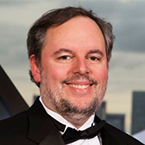
Dr. Elledge is best known for the discovery and elucidation of the DNA damage response in eukaryotes. He discovered the DNA replication stress-induced transcriptional response in yeast and was the first to advance the concept that eukaryotes activated a signal transduction pathway that sensed and responded to genotoxic stress, setting the stage for unraveling this critically important area of biology. This intellectual framework guided the field and allowed him to establish much of the mechanism of DNA replication stress sensing, signal transduction through a kinase cascade, control of repair and cell cycle arrest, and, ultimately, its tumor suppressor function in control of p53.
While defining these fundamental principles, Dr. Elledge discovered the key cell cycle regulators Cdk2 and the first Cdk inhibitor, p21 with Wade Harper, as well as the imprinted Cdk inhibitor p57 responsible for Beckwith-Weidemann syndrome. While investigating regulation of Cdk inhibitors, Dr. Elledge discovered Skp1 and F-box proteins and was the driving force in elucidation of the mechanism of regulated protein destruction in eukaryotes through modular cullin-ring ligases. Both of these discoveries have widely influenced medical research.
Through the development of new genetic tools and the genetic exploration of human cells, Dr. Elledge uncovered how haploinsuffuiciency and triplosensitivity of oncogenes and tumor suppressor genes can explain how aneuploidy drives cancer. Collectively, Dr. Elledge’s discoveries related to the genetic and molecular underpinnings of the cell cycle, DNA damage, and protein turnover have been critical to the current understanding of cellular homeostasis, genetic instability, and tumorigenesis.
Career Highlights
2017 Breakthrough Prize in Life Sciences
2015 Albert Lasker Basic Medical Research Award
2013 Canada Gairdner International Award
2012 Lewis S. Rosensteil Award for Distinguished Work in Basic Medical Science
2012 American-Italian Cancer Foundation Prize for Scientific Excellence in Medicine
2010 Dickson Prize in Medicine, University of Pittsburgh
2006 Elected Member, Institute of Medicine
2005 Hans Sigrist Foundation Prize, University of Bern
2005 Elected Member, American Academy of Microbiology
2003 Elected Member, National Academy of Sciences, Washington, D.C.
2003 Elected Fellow, American Academy of Arts and Sciences
2002 Michael E. DeBakey Excellence in Research Award
2002 National Academy of Sciences Award in Molecular Biology
2001 Paul Marks Prize for Cancer Research, Memorial Sloan-Kettering Cancer Center
2001 AACR-G.H.A. Clowes Memorial Award
1983 PhD, Massachusetts Institute of Technology